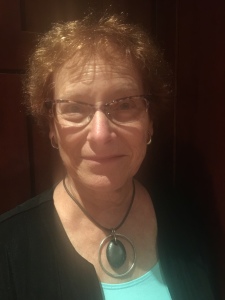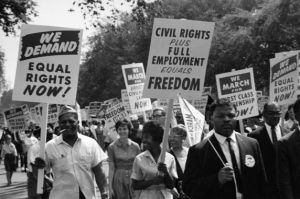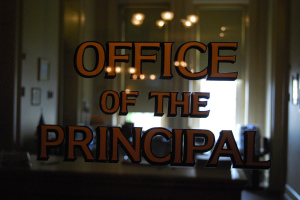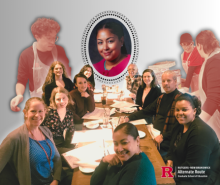From Teaching Children and Leading Colleagues to Creating New Pathways for More Teachers
 In this month’s Alternate Route Spotlight, we interviewed Harriet Beckerman, a staunch champion of alternate route teacher certification programs and instructor with Rutgers University Center for Effective School Practice’s 200-hour Alternate Route Program. Although Beckerman followed a traditional pathway to teaching, she plays a key role in supporting aspiring career changers and recent college graduates on their quest to learn the art and science of teaching via New Jersey’s Alternate Route Teacher pathway. Alternate route teachers benefit from her wisdom regularly when they attend her weekly classes in Camden. This month’s blog post reveals just how deeply Beckerman’s well of wisdom runs.
In this month’s Alternate Route Spotlight, we interviewed Harriet Beckerman, a staunch champion of alternate route teacher certification programs and instructor with Rutgers University Center for Effective School Practice’s 200-hour Alternate Route Program. Although Beckerman followed a traditional pathway to teaching, she plays a key role in supporting aspiring career changers and recent college graduates on their quest to learn the art and science of teaching via New Jersey’s Alternate Route Teacher pathway. Alternate route teachers benefit from her wisdom regularly when they attend her weekly classes in Camden. This month’s blog post reveals just how deeply Beckerman’s well of wisdom runs.
1. What inspired you to become a teacher?
 The Civil Rights movement was a formative element of my high school and college years. We strove for the lofty ideals of justice, freedom and equality. Hearing Dr. King give his inspiring "I Have a Dream" speech at the March on Washington while tutoring city kids in reading was very moving for me.
The Civil Rights movement was a formative element of my high school and college years. We strove for the lofty ideals of justice, freedom and equality. Hearing Dr. King give his inspiring "I Have a Dream" speech at the March on Washington while tutoring city kids in reading was very moving for me.
I saw firsthand the diversity challenges of the New York City public schools I attended. Later, my thoughtful John Dewey-inspired private high school education inspired me to want to make a difference in the lives of others. Although my junior high school yearbook shows that I wanted to be a teacher, so many other career possibilities captured my attention. I was a philosophy major in college and did graduate work in experimental psychology. All along, though, I was most intrigued by issues that related to learning and motivation, and finally pursued a masters in special education in order to teach.
2. Did you have any mentors who helped you throughout your teaching career?
Yes, I had many mentors and I would encourage new teachers who are just starting out to seek and cherish their mentors. Mine included some of my professors as well as teacher and administrator colleagues. Thanks to these people, I had opportunities to become a teacher leader and improve my craft as a principal. I am particularly grateful to Dr. Carol Conger who was Superintendent of the Chatham Public Schools when I taught there. She was my first female administrator role model. Willa Spicer, as Assistant Superintendent when I was an elementary principal in South Brunswick, also encouraged me to learn and grow into principalship.
3. Did your vision for your career change after your first couple years of teaching?
 Like most new teachers, I could only think as far as what I was going to do tomorrow. For me, that period lasted for years! I found that three years made a difference—after that I knew what to expect more of the time and had developed a teaching style that kept students engaged and moving forward. Then, I started to attend professional meetings and learned new strategies.
Like most new teachers, I could only think as far as what I was going to do tomorrow. For me, that period lasted for years! I found that three years made a difference—after that I knew what to expect more of the time and had developed a teaching style that kept students engaged and moving forward. Then, I started to attend professional meetings and learned new strategies.
After giving myself enough time to process my teaching career, I realized that I felt like someone was making decisions that affected my classroom—and that person wasn't me. I began to look at my school as a system and started to think about what it would take for me to be the one making those big choices. That’s when I decided to become a principal.
4. Would you consider yourself a lifelong learner?
 I love to learn and to share what I have learned. You really learn something when you talk about it with others, hear and respond to what they think about it. I read a lot and have made it a habit to attend professional meetings. Materials from the Association of Supervision and Curriculum Development and the National Council of Teachers of Mathematics have been great resources for me.
I love to learn and to share what I have learned. You really learn something when you talk about it with others, hear and respond to what they think about it. I read a lot and have made it a habit to attend professional meetings. Materials from the Association of Supervision and Curriculum Development and the National Council of Teachers of Mathematics have been great resources for me.
So much is accessible on the Internet that it’s completely changed how I learn! Our Alternate Route program spent a lot of time advising teachers on how to use social media to grow professionally. As an instructor of the program, I was pushed to start using Twitter professionally and since have been intrigued by the possibilities.
5. What inspires you to make time for professional development?
When you care about something, you make time for it. I care deeply about creating successful opportunities for learning. Once when I was teaching ninth graders with reading deficits, after attending a workshop on using meaningful materials, I started to teach reading with the driver's test preparation manual and saw students really grow. Recently, the pay off [of my professional development effort] was even more immediate—I had been reading Carol Dweck’s work on growth and fixed mindsets and then had the opportunity to teach it in Rutgers’ Alternate Route program in Camden. Many of the teachers had "ah ha" moments throughout the lesson that I believe will influence their practice.
6. Why did you decide to work with Rutgers University’s alternate route program?
We need good teachers! Sure, people can learn on their own if they are motivated and have the resources but it is an uphill battle. Good teachers = learning!
Once, when I was a new principal, I offered a workshop on learning styles to my staff. When I looked at the group that had my style, I realized I had hired them all. Who wants a school of clones? What does that serve? I vowed that from that point forward I would hire teachers with a variety of styles, backgrounds and challenges. The Rutgers’ Alternate Route program supports all different types of teaching styles and allows me to help bring that breadth to the classroom.

 Heather Ngoma has over 25 years of experience collaborating with educators across New Jersey to drive education innovation. She currently serves as the Director of the Rutgers-GSE Alternate Route Program in the Department of Learning and Teaching, a program which helps career changers, recent college graduates, and other aspiring education professionals become licensed teachers in New Jersey. Follow her on Twitter @heatherngoma.
Heather Ngoma has over 25 years of experience collaborating with educators across New Jersey to drive education innovation. She currently serves as the Director of the Rutgers-GSE Alternate Route Program in the Department of Learning and Teaching, a program which helps career changers, recent college graduates, and other aspiring education professionals become licensed teachers in New Jersey. Follow her on Twitter @heatherngoma.





